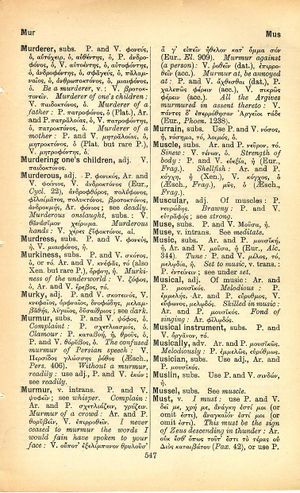must
μηδ' εἰς ὀρχηστρίδος εἰσᾴττειν, ἵνα μὴ πρὸς ταῦτα κεχηνὼς μήλῳ βληθεὶς ὑπὸ πορνιδίου τῆς εὐκλείας ἀποθραυσθῇς → and not to dart into the house of a dancing-woman, lest, while gaping after these things, being struck with an apple by a wanton, you should be damaged in your reputation
English > Greek (Woodhouse)
v.
I must: use P. and V. δεῖ με, χρή με, ἀνάγκη ἐστί μοι (or omit ἐστι), ἀναγκαῖόν ἐστί μοι (or omit ἐστι). This must be the sign of Zeus descending in thunder: Ar. οὐκ ἔσθʼ ὅπως τοῦτʼ ἔστι τὸ τέρας οὐ Διὸς καταιβάτου (Pax. 42), or use P. and V. verbal in τέος. I wished first to learn what must be done: V. πρώτιστʼ ἔχρῃζον ἐκμαθεῖν τί πρακτέον (Soph., O.R. 1439). You must have drawn up this indictment to make trial of us: P. οὐκ ἔστιν ὅπως σὺ . . . οὐχὶ ἀποπειρώμενος ἡμῶν ἐγράψω τὴν γραφὴν ταύτην (Plat., Ap. 27E). They must be wrong: P. κινδυνεύουσιν ἁμαρτάνειν. I love my own children, else I must be mad: V. φιλῶ ἐμαυτοῦ τέκνα. μαινοίμην γὰρ ἄν (Eur., I.A. 1256). These doctrines must be harmful: P. ταῦτʼ ἂν εἴη βλαβερά (Plat., Ap. 30B). subs. Must of wine: Ar. τρύξ, ἡ.

